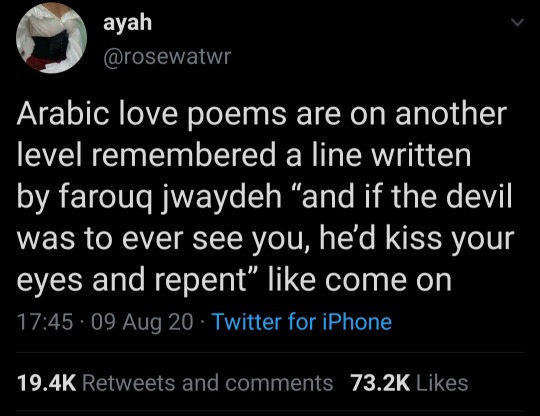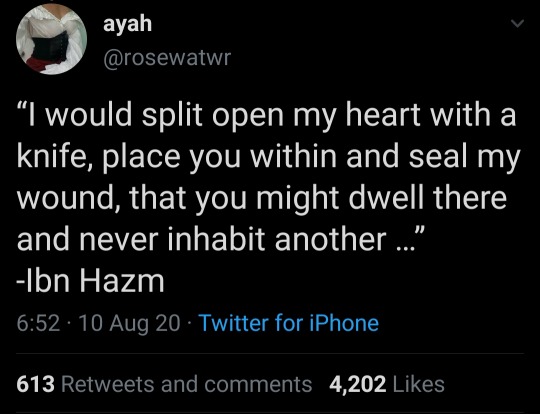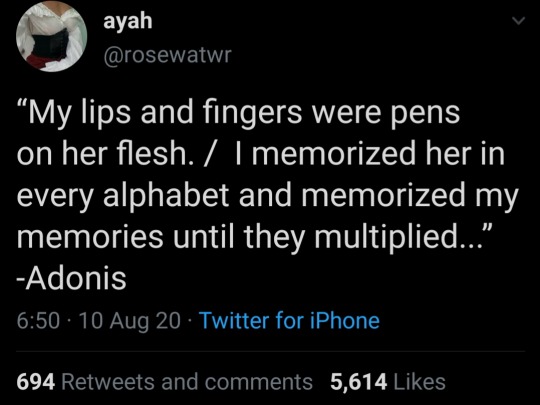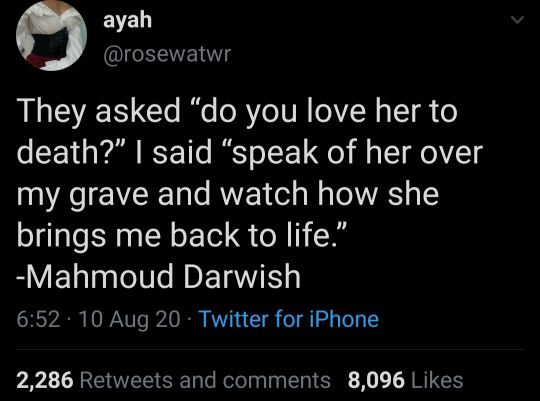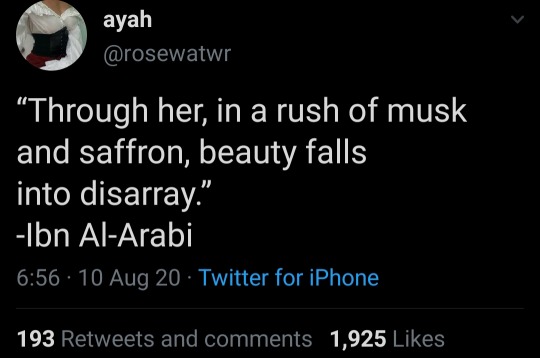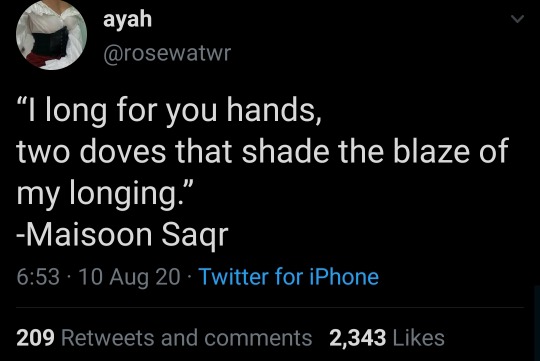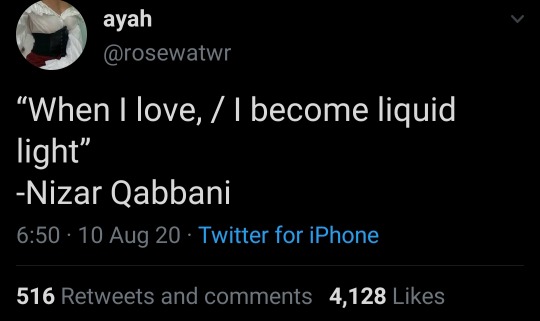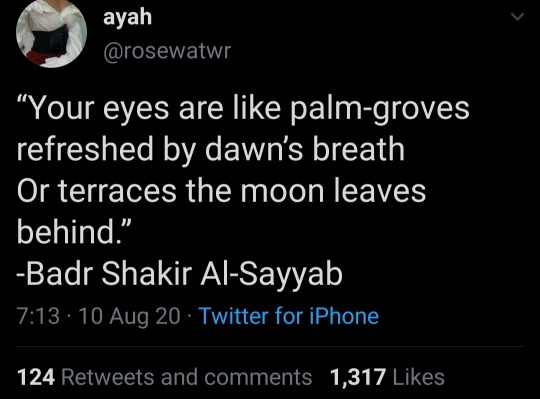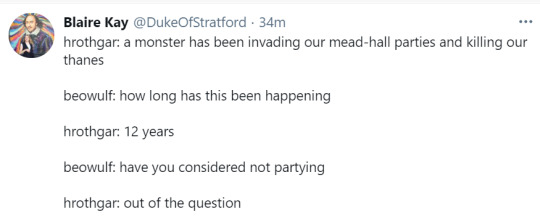Sòl, he\e /@the-songs-we-knew serious literature sideblog/ neach-ionnsachaidh/postgraduate celticist and medievalist
Last active 4 hours ago
Don't wanna be here? Send us removal request.
Text
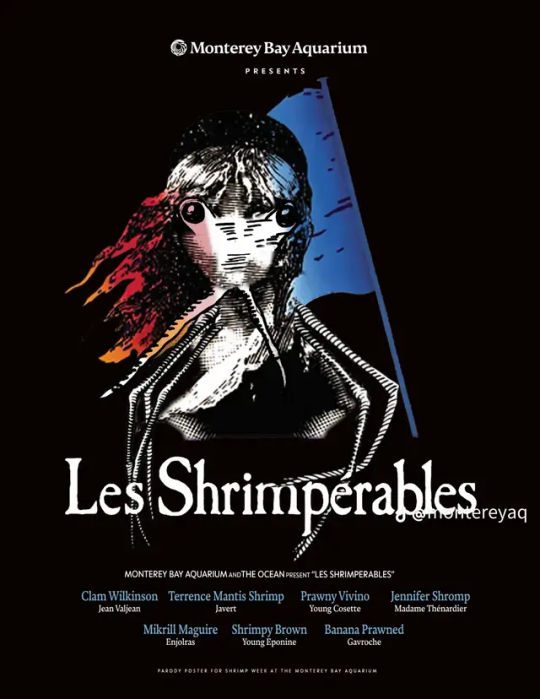
THIS WAS POSTED ON THE OFFICIAL MONTEREY BAY AQUARIUM TIKTOK
1K notes
·
View notes
Text
Aig Cladh Hallain by Aonghas Phàdraig Caimbeul
Tha mi tadhal air m’ athair’s mo mhàthair, ���s tha iad a’ cur fàilt’ orm, ged nach robh dùil aca rium ‘s ged nach eil sìon deiseil.
Tha aparan oirre-se ‘s i fuinne ‘s a’mhin a’ còmhdachadh a gàirdein, ‘s tha e fhèin na sheasamh aig a’ bheinge a’ locradh pìos fiodh: uinneag.
Tha an doras fosgailte agus troimhe cluinnidh mi an ceòl: pìobaireachd a’ tighinn a-nuas an cnoc, agus saoil nach e siud Fear a’ Chòta Ruaidh?
Bu mhath leam a bhith sàmhach, ach tha m’ athair ah ràdh nach e seo an t-àm. Seo an t-àm, tha e ag ràdh, urram a thoirt dha gach nì tha beò.
Mar an t-eun beag ud thall air a’ bhalla. Tha e falbh, ‘s mar as àirde dh’èireas e ‘s ann is soilleire an ceòl. Dùisgidh na mairbh nuair a dh’èireas na beò.
Tha sinn gar call fhèin a’ còmhradh. Tha iad ag iarraidh orm fuireach, oir tha an tì gu bhith dèanta, ‘s an leabaidh uile deiseil, le cuibhrigean ùra blàth
ach tha mi ag ràdh gum feum mi falbh is gun tadhail mi latha eile. Tha iad a’ seasamh aig an doras ‘s a’ smèideadh, fhad ‘s tha mi dùnadh a’ gheat’ às mo dhèidh.
16 notes
·
View notes
Text
Eòghann's guide to vetting Celtic information sources
(this is purely from my experience as a lay-person, there are much more qualified people out there who will be able to say more about this than me I suggest you listen to them)
Celtic soup - Does this person refer to all Celtic cultures and history as a monolith? Do they provide Gaelic prayers for Welsh deities for example? Do they say things like "Ancient Celts believed xyz" only for you to find out that they meant Medieval Christian Ireland?
If prayers/hymns etc are being provided, is it just the English translation or do they show the original text too? Is there any use of relevant Celtic languages at all?
If only the English translation of a text is given, have the translators provided interpretation notes and sources? Do they reference other interpretations of lines with ambiguous meaning?
Is use of Celtic languages accurate? If they're talking about Celtic terminology and it's spelled incorrectly or there are grammar errors, I personally would doubt the thoroughness of their research
Are they overly concerned with "Celtic blood" and DNA? This one is less about information sources and more for vetting people arriving in Celtic spaces, but still worth mentioning. Celtic identity is primarily defined by the languages and the cultures which go with them. Obsession with blood percentages is a good sign you're dealing with a white supremacist
Do they refer to Celtic people only in the past tense? "Beltane was xyz" "Celtic people believed abc". This one's a bit more subtle but sometimes you just get the vibe that the author doesn't know we still exist. Sometimes you can just tell that they've never spoken to a real life Celtic person before
339 notes
·
View notes
Text
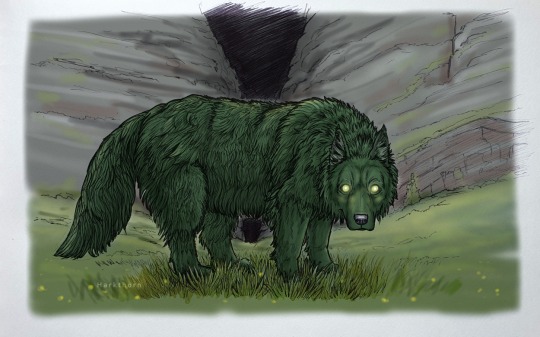
You've likely heard of the cat-sìth, if only because of FF7, but did you know there's also the cù-sìth (coo-shee)?
This is just a messy daily sketch, maybe one day I'll do a proper piece
-2327
118 notes
·
View notes
Text
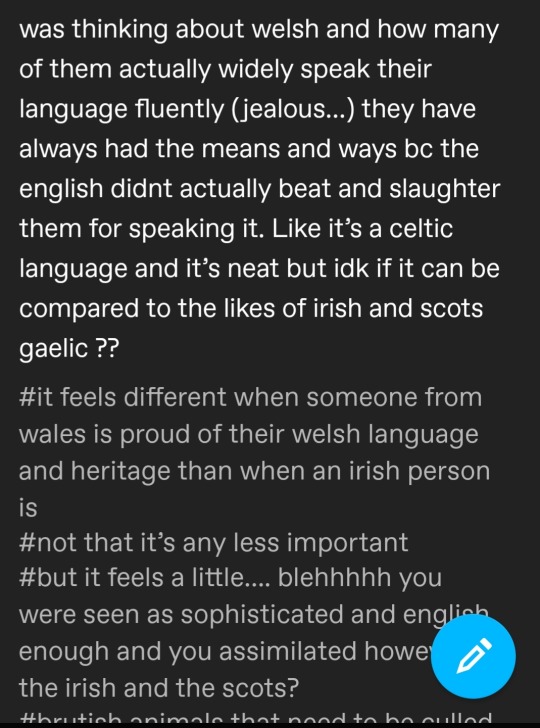
I'd like to preface this with that this is a screenshot of a post I saw a few days ago in the #welsh tag and that the OP has since deleted this post, but the sentiment is something I'd like to address since I see a lot of parallels with this kind of thinking in other contexts, such as in LGBTQIA+ rights conversations.
So, the most obvious elephant in the room is the idea that Welsh is super widely spoken in Wales now and that it isn't in as much danger as other Celtic languages. This idea is wishful thinking at best and erases the very real danger that Welsh is in and that it could be lost just as easily as Irish or Scottish Gaelic. Cornish (which is related to Welsh) actually did die out and has had to be revived. To make a metaphor out of this, we classify languages on a scale of non-threatened to endangered in a similar way to how we classify species.
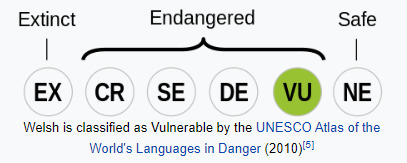
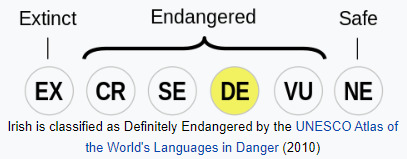
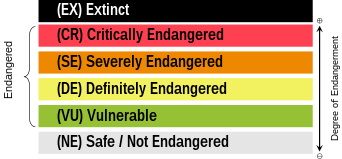
Here are the statuses of Welsh and Irish as of 2010 (above) and the statuses of Lions and Tigers (below).

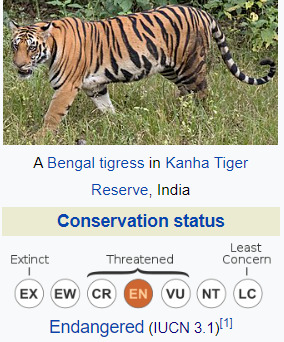
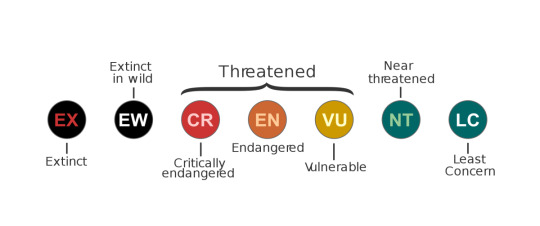
On paper tigers are more 'in danger' than lions. But that does not mean that lions are suddenly not in danger at all. The little bracket above CR, EN and VU labels all of these classifications as threatened. It isn't (and definitely shouldn't) be a competition of 'who is most in danger' because you do not want the thing you care about (whether it be a species or a language) to be in danger.

To come back to the original screenshot "they* [Welsh speakers] have always had the means and the ways because the English didn't beat or slaughter them for speaking it"- on the most basic of levels, this is just incorrect. The Welsh Not was a wooden token hung around schoolchildren's necks if they spoke Welsh in school. If someone else spoke Welsh the Not would be hung around their neck. At the end of the school day, whoever was wearing the Not would be beaten and caned by their teachers. I needn't go into much detail but there have been concerted efforts to beat Welsh out of schoolchildren. With the lions vs tigers metaphor, making the claim Welsh speakers have never been beaten for speaking Welsh because they always had the means and ways, while Irish speakers were beaten and never had the means or ways is like claiming poachers have never shot lions, only tigers. Bottom line is, lions and tigers are both victim to poaching and both species have suffered as a result. Similarly, Welsh and Irish have both suffered language loss and both need conservation efforts in order to survive.
(*sidenote- the consistent use of 'them' and 'they' in the original post is definitely indicative of a 'us vs them' sentiment which is a deeply unhelpful attitude to have when it comes to endangered languages and the Celtic languages in particular)
I see parallels with LGBTQIA+ rights in this situation. When equal marriage came in for gay and lesbian couples in the UK in 2014, many allies began to act like gay rights had now been achieved and that gay issues had been done, they're solved. Except, they really weren't (and aren't). Progress has been made in Wales and undeniably Welsh is doing the best out of the living Celtic languages. But that doesn't mean Welsh has been saved or that full equality for Welsh speakers has been achieved. It very much hasn't. The sentiment of the post in the screenshot is not conducive to helping Irish or Scottish Gaelic. Putting down Welsh speakers and erasing Welsh-language history will not save Irish or Scottish Gaelic. Pretending Welsh has had it easy in some kind of lap of luxury is a deeply harmful and bogus claim.
I'll address the tags under the cut as this post is getting long.
To address the tags, personal feelings ≠ an accurate reading of a situation. Nor is it praxis, for that matter. Why is pride in Welsh different/less good than pride in Irish? Is it the assumed proximity to England? If so, that's a terrible claim to make. Not only that, but Scotland is also next to England- does that make pride in Scottish Gaelic the same as pride in Welsh according to this metric? It's a ludicrous thing to say and deeply insensitive to the needs of Scottish Gaelic and Welsh speakers, who cannot help any current or former proximity to England.
Additionally, proximity to England ≠ worse. I know it's a popular internet joke to hate on England because of English attempts to eradicate the Celtic languages, but when the joke becomes praxis, it does not help. England ≠ a place devoid of Celtic languages either. Many English counties near the Welsh border actually have communities of Welsh speakers, such as Oswestry (Croesoswallt) in Shropshire. Cornwall is also home to many speakers of revived Cornish. It does a disservice to Celtic speakers in England to insinuate that proximity to England taints or corrupts them somehow. This is how ethnonationalism starts and we ain't about that.
And "#it feels a little.... blehhhhh you were seen as sophisticated and english enough and you assimilated however the Irish and the Scots? #brutish animals that need to be culled". So, this is arguably one of the worst things to say about a Celtic language- or any threatened language in general. First of all, the 'you were seen as' - 'you' is very telling. The switch from 'them', 'they' to 'you' indicates that this sentiment is aimed at Welsh speakers directly. This was likely a subconscious thing that OP wasn't thinking about when they wrote this. But it does indicate unhealthy feelings of jealousy and bitterness unfairly directed at Welsh speakers, who are also struggling. This righteous anger at the decline of Irish and Scottish Gaelic would be better directed at efforts to help promote those languages- some useful things to get involved with are LearnGaelic, similar to DysguCymraeg but for Scottish Gaelic or supporting channels such as Irish channel TG4 by watching their programmes.
The idea that Welsh speakers were or are 'sophisticated and english enough' is insulting and carries with it a lot of baggage of how any of these assumptions came about. Welsh speakers were definitely not seen as sophisticated. Where Welsh was 'tolerated', it was treated as a curiosity, a relic of a bygone age. Classic museification which all Celtic languages and cultures suffer from as well. Welsh was not tolerated in any legal sense since 1535- with English becoming the only valid administrative language and the language of Welsh courts after England annexed Wales into its Kingdom. Monolingual Welsh speakers suddenly had no access to any legal representation, unless they learned English. This is no voluntary assimilation- it is an act of survival for many speakers of minoritised languages to 'assimilate' into the dominant culture, or else risk losing access to legal security and other kinds of infrastructure. You need only ask any non-native English speaker living in an Anglophone country what that process is like. Welsh people did not see English incursion as an opportunity to become 'sophisticated and english enough', they had to assimilate in order to survive.
The "Irish and the Scots? #brutish animals that need to be culled" is also painfully misrepresenting a very complex social and political process that unfolded over the span of hundreds of years. The phrasing itself of 'brutish animals that need to be culled' speaks to righteous anger at the damage done to these languages and cultures, but it reinforces negative stereotypes about the Irish and Scots themselves. It also is more complicated than a simple English hatred of anything non-Anglo, since the English conception of particularly the Irish changed a lot over the centuries. It was (and still is) rarely consistent with itself. See: the enemy is both strong and weak. The very earliest Celticists were by and large, Anglos or French.
Ernest Renan (1823-1892) for example, was an early French Celticist who published La Poésie des races celtiques (Poetry of the Celtic Races- English translation) in which he says:
"... we must search for the explanation of the chief features of the Celtic character. It has all the failings, and all the good qualities, of the solitary man; at once proud and timid, strong in feeling and feeble in action, at home free and unreserved, to the outside world awkward and embarrassed. It distrusts the foreigner, because it sees in him a being more refined than itself, who abuses its simplicity. Indifferent to the admiration of others, it asks only one thing, that it should be left to itself. It is before all else a domestic race, fitted for family life and fireside joys. In no other race has the bond of blood been stronger, or has it created more duties, or attached man to his fellow with so much breadth and depth"
Yeah. This guy (unsurprisingly) was a white supremacist. Note that this sentiment is being applied to all people considered Celtic by Renan- Irish, Welsh, Breton, Scottish, Cornish, Manx etc. None unscathed by the celtophobia of the day. In this period, Celticity was romanticised (yet disparaged at the same time). It is less 'brutish animals' and more 'archaic, time-frozen peoples' in this period. Of course, 'brutish animals' attitudes towards Celticity did still exist, but it is disingenuous to act as if it was this attitude alone which drove English celtophobia. Like many things, it is always more complicated and never clear cut as it might seem.
I'll bring this to a close shortly, but returning to OP's suggestion that the Welsh assimilated and the Scots and Irish did not, is also incorrect in that some Scots did have to assimilate to survive as well. The Statutes of Iona (1609) required Scottish Gaelic speaking Highland chiefs to send their sons away to be educated in Scots and/or English in Protestant schools. Many did as the statutes required, which led to further language loss in the Highlands of Scottish Gaelic. These are acts of survival- and not ones always taken willingly.
This has been a long post but it's one which I felt I wanted to address. There's no need for infighting between speakers of Celtic languages over who has it worse. There isn't any answer to that question, nor is it a good use of time or energy. All in all, the Celtic languages have suffered greatly over the years and its only just now that some of them are turning a corner. If you care about these languages, put your energy into something good. Only through active work will these languages be saved for generations to come.
1K notes
·
View notes
Text
the parasocial relationship between you and the guy whose article you cite the most in your paper
27K notes
·
View notes
Text
Troilus was the original simp pass it on
#he really was just cursed to be a simp huh#Troilus and criseyde#Chaucer#geoffrey chaucer#Troilus#I’m having fun with my vac reading#Boccaccio#il filostrato#troilus and cressida#Boethius#english literature#medievalist
40 notes
·
View notes
Text
The chronicle of the monk Herbert of Reichenau for the year 1021 ends “My brother Werner was born on November 1.“
1021 was not an uneventful year. The emperor began a campaign into Italy. Illustrious abbots died. There was an earthquake. But Herbert took the time to note, at the end of the year, that his brother was born.
Of such acts of tenderness is history made.
122K notes
·
View notes
Text
i can’t believe people expect me to do anything in my life except reading books, listening to music and crying at every little inconvenience
34K notes
·
View notes
Text
starting a petition to bring back the following Old English words:
meolcliðe - lit. milk soft, used to describe someone who is very gentle. hleów-feðer - lit. shelter feather, when you put an arm around someone to comfort them.
1K notes
·
View notes
Text
English bakers in 1066 when everyone starts asking for baguettes
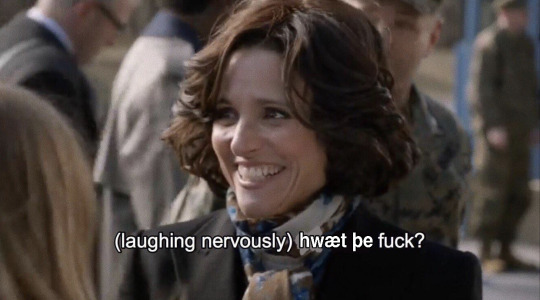
2K notes
·
View notes
Text
also shoutout to one of the old english spellings of “strawberry,” streawberige
8K notes
·
View notes
